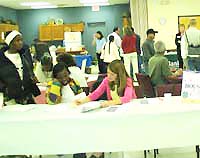Program Aids Refugees with Economics of Living in the United States
Program Aids Refugees with Economics of Living in the United States

Learning a new language is only one challenge refugees face when moving to the United States. There is also the need to understand how to supply their basic needs and wants.
To help the diverse international community in Warren County better understand such tasks as finding housing, signing up for basic services and learning their way around the marketplace, the University of Kentucky Cooperative Extension Service teamed with the local International Center to hold Real Life 101.
“We decided we would do something for the adult community similar to the Reality Store which is for eighth-graders,” said Janet Turley, Extension agent for 4-H Youth Development. “That’s where we came up with Real Life 101. It’s the first time we’ve ever tried it with an adult group. The goal of this project is to give them a budget and economic work through.”
Participants represented 11 nationalities. Objectives of the program were to give them a realistic idea of what things cost in this country, help them practice writing checks and to give them opportunities to interact with the business community.
“With them being so new to the United States, they had unrealistic ideas of what things cost so we wanted to show them the true costs such as what it takes to rent a house,” she said.
Patti Meacham is education director at Western Kentucky Refugee Mutual Assistance Association, a nonprofit refugee resettlement organization known as the International Center. While most of the clients they serve are refugees, they also provide some educational services to immigrants, she said.
“A lot of our education is to teach English to survive in the United States and part of that is being able to manage their money and their finances,” she said. “The Real Life 101 program is an extension of that.”
To prepare them for Real Life 101, instructors at the center did some prep work on budgeting and assigned each participant a mock salary.
“We started out asking people if they knew what their salaries were. If they didn’t know or didn’t have one we assigned them one based on what might be an average wage for the jobs our people are placed in,” Meacham said. “We have a person whose full-time job is to find jobs for our clients.”
Once salaries were established, participants moved from one booth to another to learn about housing, food, utilities, child care, transportation and clothing costs. At each booth, they made spending decisions based on various alternatives available to them, and once they made their decisions the costs were deducted from their salaries. There were also booths on medical insurance, banking and communications.
For some the money ran out before they got through all the stations. A public assistance component was not included in the program so participants could see actual costs. However, after they completed the program those options were outlined for them at an S.O.S. booth.
Ginny Nwe, a Burmese refugee, has been in Bowling Green for five months.
“I think this is quite good for us,” she said. “It is a good experience.”
Warren County’s Extension Council voted to take on the project and provided a number of volunteers. There were also volunteers from the business community, and all Warren County
Extension agents also pitched in.
“It is important for Extension to reach out to underserved audiences, and this is hopefully a foot in the door so we can let them know we do offer educational services,” Turley said. “They will be getting information on food preparation and recipes that work well with the food stamp program, a garden calendar and other supplies. Hopefully, the experience will help them and be something they want to do again.”